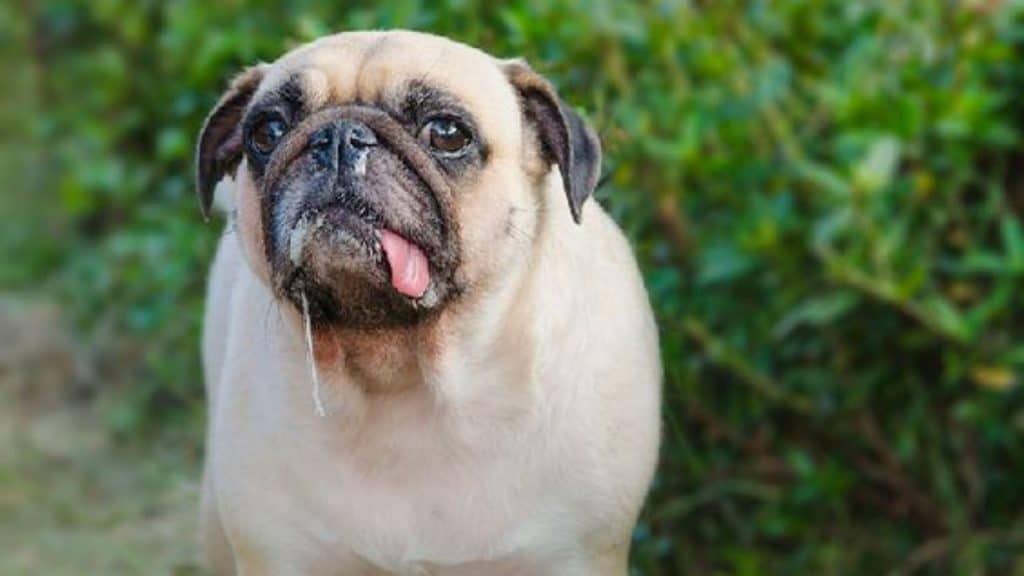
When you see your Pug have a runny nose, you might wonder what’s the issue. Infections, allergies and a variety of reasons can lead to Pug’s runny nose.
While most of the time, there are no big issues with your Pugs.
Understanding the causes and when to be concerned about nasal discharge in Pugs will help you take better care of your furry friend.
Let’s begin with …
Do Pugs Have Runny Noses? Is it Normal for My Pug to Have a Runny Nose?
Pugs could develop runny noses. A small quantity of clear snot from the nose is perfectly normal.
In fact, due to the Pug’s flat face, oftentimes nasal discharge is more visible than it may be on another breed.
Brachycephalic dogs like Pugs are also typically more prone to producing nasal discharge along with associated respiratory conditions. This means your Pug might be more susceptible to symptoms like runny noses, sneezing, itching, and breathing difficulties.
Any signs of severe respiratory distress should be referred to a veterinary professional as soon as possible.
Common Causes of a Runny Nose in Pugs and What to Do About it
There is a wide range of possible causes behind a Pug runny nose. Most should clear up on their own, however, others may require the attention of a veterinarian.
Below we’re going to outline some of the main causes of runny noses in Pugs and what you should do for your pet under these circumstances.
1. Allergies
Allergies are a very common cause of runny noses in Pugs. Just like us humans, Pugs and other canines can develop allergies resulting in nasal discharge.
There are many things that a Pug might be allergic to.
Things like…
- Pollen
- Chemicals
- Certain foods
- Dander
If you think that your Pug might be suffering from allergies then look out for the common accompanying symptoms:
- Excessive clear nasal discharge
- Eye discharge
- Itchiness
- Sneezing/ coughing
- Difficulty breathing
- Nose bleeds
What to do
The best way to reduce a runny nose caused by allergies is to avoid your Pug’s allergy triggers. If you already know what’s causing your Pug’s allergies to flare up then make sure to limit their exposure to that particular allergen.
If you don’t know what’s causing your Pug’s allergies, your vet will be able to carry out an allergy test to determine the cause of their symptoms.
To treat this kind of allergic reaction, your Vet might prescribe allergy medications such as antihistamines, immunosuppressants, steroids, or biologicals.
2. Blockages
Blockages can also cause runny noses in Pugs. A blockage is simply anything that gets stuck in your Pug’s nostril. That could be a blade of grass, for example, or a seed.
When a foreign object like this gets stuck it causes excess discharge to stream from the nose.
Other symptoms you may notice include:
- Sneezing
- Pawing at their nose in an attempt to get it out
- Nosebleeds
What to do
If it is safe to do so you can locate the blockage yourself and carefully remove it using tweezers.
However, if you’re not comfortable doing this yourself (or if the blockage is extensive) then it’s best to get your vet to do it.
3. Infections
Runny noses are common symptoms of many types of infection including bacterial, viral, and fungal infections.
Because of the way a Pug’s nasal passages and skull are formed, they are more prone than non-brachycephalic breeds to developing nasal infections.
Symptoms to look out for include:
- Bad odor
- Nosebleed
- Coughing/ choking
- Green or yellow mucus or nasal discharge
What to do
If you think that your Pug might be suffering from infection then it’s important to visit your veterinarian as soon as possible. Your vet will need to diagnose the type of infection and prescribe the most appropriate treatment accordingly.
If your Pug has a bacterial infection, your vet will prescribe antibiotics. For fungal infection, antifungal drugs will be needed.
In some cases, if a Pug develops a chronic infection, then surgery might be required.
4. Polyps & Tumors
A runny nose (especially when accompanied by blood) can be a sign that your Pug has a polyp or tumor in their nasal cavity.
Symptoms to look out for include:
- Blood
- Pus
- Mucus
- Noisy breathing
- A bulge on the side of the nose
- Decreased appetite
What to do
If you notice any of these symptoms you should visit your vet immediately. Your Pug will probably need surgery to remove the polyp/ tumor.
In the best case scenario, if the tumor is benign, it will simply be removed. However, if the tumor is malignant (cancerous) then your Pug may need radiation treatment on top of surgery.
5. Mites & Parasites
You might not think so, but sometimes mites and parasites can be the cause of a runny nose. Dogs can pick up nasal mites when nuzzling around in the dirt (which we all know they love to do).
These nasal mites then take up residence in a dog’s nasal cavity and sinuses.
Symptoms of nasal mites include:
- Itching
- Sneezing
- Chronic nasal discharge
- Nosebleeds
What to do
To treat nasal mites your vet will prescribe anti-parasitic medications.
6. Dental Diseases
Another unexpected cause is dental disease. If your Pug develops an abscess in their teeth then this will sometimes cause nasal discharge.
Typically accompanying symptoms include:
- Bad breath (halitosis)
- White gums
- Excessive drooling
- Swollen face/ eyes
- Signs of tenderness and/or pain
- Red or bleeding gums
- Swollen gums
- Difficulty chewing
What to do
It’s vital that an abscessed tooth gets seen as soon as possible.
If left to develop, your Pug’s symptoms could become much worse, resulting in serious eye infections, periodontal disease, or even organ failure in the worst case scenario.
7. Cleft Palate / Fistula
In rare cases, a runny nose might be the result of a cleft palate or fistula. If your Pug has a cleft palate it means that the two sides of their palate did not fuse together properly.
A fistula is a hole between the nose and the mouth that can be caused by injury, infection, or tooth decay.
If either of these conditions is causing your Pug’s runny nose, you might notice that your Pug’s nose runs excessively after eating.
8. Canine Flu
Finally, your Pug’s runny nose might be the result of the flu.
It seems obvious, right?
Just like us, dogs can get a version of the flu called canine flu.
This is not the same flu virus that affects humans, but it can cause canines to develop similar symptoms such as a runny nose, coughing, sneezing, fever, and loss of appetite.
Canine flu usually goes away on their own with a bit of TLC. More serious cases (e.g. if your Pug stops eating and drinking) should be seen by a vet.
What to do
Mild cases of canine flu usually go away after a period of rest and TLC. However, it’s important to know when you should refer your pet to the care of a professional.
If you start to notice colored discharge then you must visit your veterinarian. In such cases, your Pug might need antibiotics or anti-inflammatory drugs that can only be administered by a veterinarian.
How to Prevent Pugs from Having a Runny Nose
Whilst it’s not always possible to prevent a runny nose, there are a few things you can do to avoid these annoying symptoms.
Wiping down your Pug’s nose regularly, avoiding known allergens, and harsh chemicals, are great ways to keep your Pug healthy.
Top this off with an excellent diet and plenty of fluids and you’re good to go.
Just remember, if you’re ever concerned about your Pug’s symptoms, it’s always better to visit your vet as soon as possible for a check-up.
When to be Concerned About a Runny Nose
The most important thing to do as a Pug parent is to keep an eye on your Pug so that you know what’s normal for them. If things ever change considerably, you’ll know it’s time to visit the vet.
For example, if your Pug starts to produce more nasal discharge than normal, or if it changes color (look out for anything of a brown or greenish tone), then it’s time to take note.
Furthermore, if you notice any behavioral changes like loss of appetite or energy these are all signs that you need to book an appointment with your vet.
Dealing With Your Pug’s Runny Nose
In most cases, you don’t have to worry too much about your Pug’s runny nose.
Whilst a runny nose isn’t always a sign that your Pug is unwell, you still need to know the signs and symptoms to look out for and when it’s time to visit the vet.
Images from Pinterest
